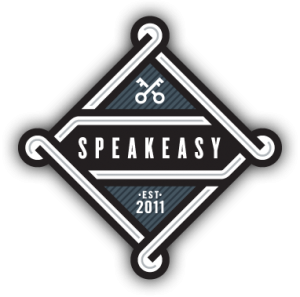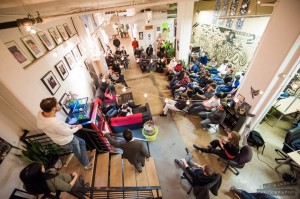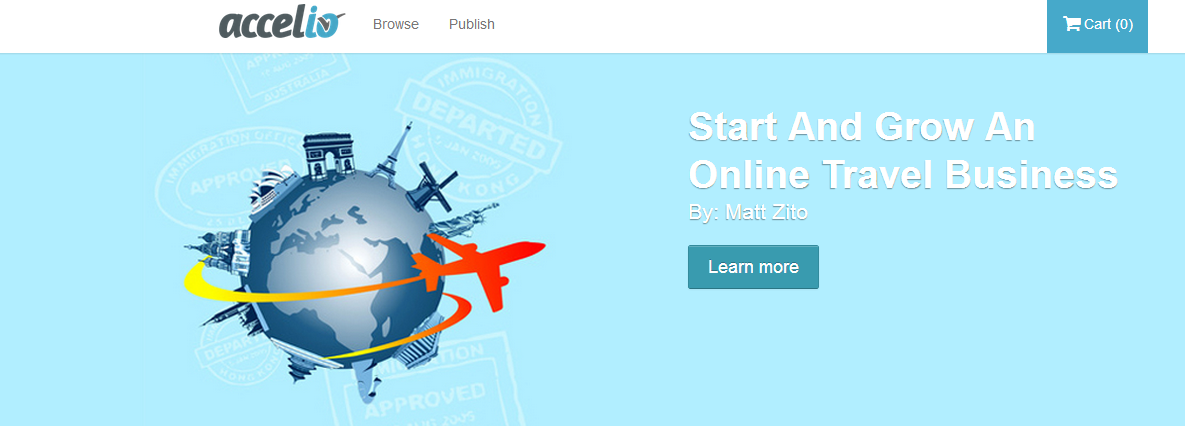node.js Developers Can Count On Cincinnati Startup, Modulus [VIDEO]
We have an incredible knack for running into Charlie Key ,the co-founder of Cincinnati startup Modulus, everywhere. We spent some time with the Modulus crew in Austin at SXSW, and two weeks ago our CEO Nick Tippmann ran into Key at the Innovation Showcase at the Indianapolis Motor Speedway.
Modulus is a platform for node.js developers. They host node.js applications in the cloud in such a way that it makes it incredibly easy for developers to scale. Key tells Nibletz, “When you want to go from 1,000 users to 100,000 user,s we can do that.” They can actually go far beyond 100,000 users.
The cloud stuff is the easy part, though. Modulus also offers a robust layer of statistics and analytics for all of the node.js developers on their platform. They can give their developer users a snapshot of exactly how many people are accessing their app, what features they are calling, and a whole lot more.
Modulus accelerated last year at The Brandery in Cincinnati and just recently moved into their own office.
Key told Soapbox Cincinnati that Modulus was actually a hodge podge of other projects the team was working on: “The business started slowly out of other projects. The Brandery application process really forced us to consolidate our ideas into a single vision; Modulus officially kicked off when we were accepted into the program.”
Now a year later the company is doing very well. Check out Nick’s interview with Charlie Key in the video below:
Follow Friday: 50 Women In Startups To Follow On Twitter
It’s Friday, that means its time for Follow Friday, a curated list of people you should follow to stay into everything “startups.” Check out some of our previous lists; 50 startup related Twitter accounts to follow everywhere else, 50 500 startups mentors to follow, and here are 100 Techstars mentors to follow.
Here at Nibeltz we try and cover women entrepreneurs, startups, and initiatives as often as we can. Earlier this week our managing editor, Monica Selby, talked about the hottest trend in tech startups: women. So to go along with that, here are 50 women in startups to follow on Twitter, starting with our managing editor.
Monica Selby, Nibletz Managing Editor
Donna Harris, co-founder 1776
Marissa Mayer, CEO Yahoo
Jessica Lachs, Founder GiftSimple
Kathleen Warner, founding team Startup America
Sarah Ware, founder Markerly
Mack McKelvey, founder SalientMG, marketing guru for startups
Alexa Andrzejewski, co-founder CEO, FoodSpotting
Kay Koplovitz founder USA Networks, SyFy network and Springboard
Bekah Grant, writer VentureBeat
Sarah Lacy, journalist, founder PandoDaily
Forbes Woman
Leesa Mitchell, VP Kauffman Foundation
Women 2.0 a site about women innovators in technology
Denver Hutt, Bad Ass Startup Chick, in Indianapolis
Jeannette Balleza, Bad Ass Startup Chick, Ark Challenge
Pam Cooper, founder Boosterville
Andrea Peterson, Tech writer, Washington Post
Kathryn Minshew, founder Daily Muse
Tina Brown Editor In Chief The Daily Beast
Kimberly Bryant, founder BlackGirlsCode
Mary Simonds, partner relations manager UpGlobal/Startup America
Reshma Saujani founder Girls Who Code
Jennifer Preston, the first social media director at the New York Times
Megan Smith, VP Google
Kara Swisher, co-founder All Things Digital
Kelly Hoey co founder at WIMAccelerator
Sheryl Sandberg, Facebook, author Lead In
Brittany Fitzpatrick Founder Mentor Me
Hillary Qwirk, Community Manager, StartCo
Alexia Tstosis, Co-Editor TechCrunch
Jessica Bennett Editor at Sheryl Sandberg’s Lead In
Courtney Boyd Myers, writer at NextWeb, serial entrepreneur
Julia Hartz CoFounder and President, Eventbrite
Padmasree Warrior Chief Technology & Strategy Officer Cisco
Lisa Stone, founder BlogHer
Randi Zuckerberg, infamous sister of Mark, founder Zuckerberg Media
Sarah Prevette, serial entrepreneur, founder Betakit and Sprouter
Anna Callahan, former Techstars, Former MassChallenge, Founder Zoomtilt
Nicole Glaros Managing Director TechStars New York
Cindy Gallop founder Make Love Not Porn
Brit Morin, founder Brit & Company, wife to Path founder Dave Morin
Kate Brodock President Girls In Tech
Joanna Stern Tech Editor ABC News, former Verge, Joshua Topolsky’s better half.
Gina Trapani cofounder ThinkUp, Founder LifeHacker
Hillary Mason, Chief Scientist Bit.ly
Sarah Perez, TechCrunch
Caterina Fake, co-founder Flickr and Hunch
Sarah Milstein cohost Lean Startup Conference
Ingrid Vanderveldt EIR at Dell
Got your ticket yet for this huge startup conference, highlighting startups everywhere else?
11 Awesome Coworking Spaces for Entrepreneurs
Working from home sucks sometimes. You can only stare at the same wall so many times before it completely drains you of all creativity. And, in my case, it’s a guarantee that as soon as I get in a groove, the children will want to tell me about their latest Lego creation.
That’s why coworking spaces can be so awesome for entrepreneurs. You can be surrounded by like-minded people, but also plugged totally into work. Many of the spaces below also offer on-site mentors and other perks.
In case you didn’t know, most coworking spaces are member-only because they often also work as incubators. But, if you’re ever traveling, a nominal fee will usually get you some space at one of these awesome hubs, and you’ll get the added benefit of networking with a whole new set of people.
If you live around one of these awesome coworking spaces everywhere else, do whatever you can to get in!
1. 1776 DC–Opened in January of this year, 1776 is a great space for entrepreneurs. Many of the businesses that work here are focused on solving our nation’s toughest problems in healthcare, education, energy, and government.
2. The Speak Easy in Indianapolis bills itself as “a combination of a 17th century salon, coffee shop, and science lab.” Companies pay yearly dues and have access to common areas and a conference room, as well as a gaming center and semi-regular events.
3. Chicago’s 1871 (named after the 1871 Chicago fire) is located in the historic Merchandise Mart. There are three different kinds of memberships that offer different levels of access to the space. They also host classes, workshops, and networking events.
4. Miami Shared is full not the average folding table coworking space. Full of windows, white walls, and stunning artwork, Miami Shared creates a unique place for entrepreneurs to work. Members get the benefit of the beautiful space, as well as networking and collaboration opportunities.
5. Green Spaces can be found in Denver, CO, New York City, and (soon) Minneapolis, MN. The space particularly hosts companies that focus on “doing good.” Collaboration, networking, and access to influencers across the world are just a few perks of being a member at Green Spaces.
6. MAKERS opened up shop in Seattle in 2011. The building is full of refurbished wood and natural light, reminiscent of Seattle’s nature-loving atmosphere. There are several tiers of membership, and non-members can rent out certain spaces at certain times.
7. 654 Work Cottage is one of the more creative uses for an old house. Don’t the let the quaint outside fool you, though. Inside the Work Cottage is a first class coworking space. They offer a range of memberships, including pay as you go.
8. The Nashville Entrepreneur Center opened last month to a little bit of controversy. Still, members of the center have access to investors, mentors, and other resources to build their companies. They also get preferred consideration for the incubator housed in the same building.
9. The Iceberg is a cool place to work in tiny Fayetteville, AR. The basement space is divided into areas, such as a coffeeshop/lounge, conference room, workspace, and resource library. Rent is affordable at The Iceberg, and they offer day passes to those passing through.
10. In Jacksonville, NC, CoWorx offers an office space for any entrepreneur. They have all the trappings of an office, but offer tiers of membership to make it affordable. Members can even rent private, furnished offices.
11. Philadelphia’s Independents Hall is tapping into the excitement that working with a group can generate. Indy Hall offers all the other essentials of a coworking space, but they really focus on the serendipity of the relationships built there. They also offer day passes for people who are passing through or want to test the waters.
Most startups and entrepreneurs could never afford the upkeep on these sleek, state-of-the-art offices. But, with the growing coworking trend, it’s so much easier to work in style.
Know of a great coworking space? Let us know which ones we left out.
Startups In The Fastlane: NMotion Startup FiscalCircles
Whether you have an MBA or a GED, startup accelerators are often the biggest push that startups need to go from idea, or earliest MVP, to actual startup and company. Startup accelerators come in all sizes and shapes from YCombinator, 500 Startups, and Techstars to The Fort, The Brandery, and Seed Hatchery. In our Accelerating in the Fast Lane stories we’ll feature an interview with a startup currently going through an accelerator.
Nebraska is filled with startups and entrepreneurs. Warren Buffet hails from Nebraska, as does the Silicon Prairie News and their Big Series of award-winning conferences. On a recent trip to Nebraska, we got to hang out with Eric Moyer the co-founder and CMO of a startup that went into Lincoln, Nebraksa’s NMotion accelerator as Fiscal Circles and has since taken on the name, HipPocket.
HipPocket helps connect consumers to loan products in a more efficient and transparent way. Find out how in our interview with Moyer below.
What is the name of your start-up?
The name of our start-up has long been a loaded question. I am however happy to report, Fiscal Circles, Inc. is now doing business as HipPocket.
What problem are you solving?
We provide insight into consumer finance which until now has lacked any form of transparency. Consumers hoping to improve their financial situation have been forced to call around or ‘take a chance’ on a loan offer that may not be in their best interest through websites like lowermybills.com, quickenloans, etc.
Why now?
Consumer adoption of online banking and more specifically, personal financial management (PFM) sites like Mint.com is trending up. Further, interest rates are poised to increase markedly in the near term. We predict that timing is right for a vast number of consumers who have been on the fence about optimizing their finances will be motivated by a changing rate environment.
Who are your competitors?
The biggest competitor in the PFM space is mint.com, but we’ve also been diligently researching other providers in the space. We’ve seen some companies doing limited comparisons of budget or FICO score but none appear to be leveraging market and peer comparison data in a significant manner. We also have a secret sauce that we’re hoping you ask us about…
What’s your secret sauce?
Our proprietary process for taking users through the comparison process is our secret sauce. We help them build a complete financial picture and provide the clearest possible explanation of where they stand now and an easy-to-understand path to a better future. This process emphasizes simplicity and fairness. Instead of utilizing persistent reminders, info-graphics and a myriad of other tactics to change consumer behavior, we’ve chosen to concentrate on saving people money on the things they already buy.
By concentrating on making refinancing or finding a new mortgage easy and providing unbiased loan recommendations, we give the consumer a fair shot at getting the best deal.
Where are you/were you based before NMotion?
Prior to NMotion, our team split time among coffee shops, Turbine Flats (a co-working space) and of course, the founder’s homes.
Why NMotion?
We applied to NMotion to gain access to resources and best practices in an effort to improve our chances for success. Plus, NMotion is dedicated to developing the start-up community of Lincoln, Nebraska. We recognize that for our venture to succeed, the area needs to be seen as a viable place for new companies to gain a foothold. Brian Ardinger and his staff at NMotion have given participating teams every opportunity to develop and successfully launch compelling products and services.
What’s one lesson you’ve learned since the NMotion session has started.
One lesson we’ve learned is that the time spent validating assumptions might be worth more than what you’re building.
Where can people find out more?
You can find us on Facebook, Twitter and now, YourHipPocket.com.
Stay tuned for more stories from accelerators everywhere else.
Startups from everywhere else attend the huge everywhereelse.co The Startup Conference.
6 Companies From Everywhere Else That Raised Money This Week
The two biggest complaints about building a company outside of Silicon Valley are 1) lack of talent and 2) lack of capital.
But that doesn’t mean NO ONE gets funded outside of Silicon Valley. Every day companies close rounds and gain that extra capital they need to scale. And, yes, they even do it outside of the Valley.
Here are 6 companies from everywhere else that raised capital just this week.
- Mediaspectrum–Based in Boston, Mediaspectrum provides a platform for big media companies (think Gannett, The Wall Street Journal, The New York Times, etc) to manage content and advertising in one place. They raised $35.8 million, led by Insight Ventures Partners.
- MobileSpaces–This Maryland company helps businesses secure mobile apps on their employees’ phones, keeping sensitive business data from leaking. They raised $8.6 million in second round funding from Accel Partners and Marker LLC.
- Vivino–This wine app from Denmark followed on their December series A with another $10.3 million. The app scans wine labels and tells the drinker what brand, varietals, vintage, and year of the wine inside the bottle.
- Objective Logistics–On July 19, the Cambridge, MA-based company announced a $5.3 million Series A. The app gamifies waiting tables, trying to incentive waitstaff that may need extra encouragement.
- Codeanywhere–The Croatia-based company bills itself as “the Google Docs for developers” and offers a Web-based code editor. On Monday they announced a $600,000 series A from World Wide Web Hosting, LLC.
- Panjo–Based in LA, Panjo is an ecommerce platform that taps into the “enthusiast market.” Within each vertical (cars, sports, pets, etc), hobbyists can sell items related to the hobby. They raised $1.6 million in seed funding, led by Spark Capital.
As I researched this story, I realized something. Few of these companies are “sexy.” They aren’t the next consumer-facing social phenomenon. They aren’t going to interest every person on earth, or even most people, really. But, most of them are solving problems encountered by people and businesses all over the world.
That’s kind of what “everywhere else” is about, right? The Valley has done what the Valley’s going to do, and now it’s time for everywhere else to step up and solve problems.
Here from several startups everywhere else that raised money this year at everywhereelse.co The Startup Conference, a Must Attend by Forbes.
Hip Hop & Startups: The Phat Startup
“This is not a parody,” The Phat Startup says on their website, and it’s not. A lot of entrepreneurs draw lessons from pop culture and contemporary issues and relate them to the passion and drive for startups.
For me, it’s usually a mashup of hip hop and basketball. My basketball references come from my favorite team the Memphis Grizzlies, known for years as the Grit-n-Grind team, which publicly showed it off to the world through the 2013 conference finals. My hip hop references come as the form of subtle musical hints in our videos based on what city we happen to be in on the sneaker strapped startup road trip.
 We’re definitely not the only ones that relate hip hop to startups. One of the more famous people in the startup world, Ben Horowitz of Andreesen Horowitz, uses a hip hop lyric at the opening of all of his blog posts, like this post about the firm’s investment in both Instagram and PicPlz where he used Mase’s “Lookin at me” to open up the post.
We’re definitely not the only ones that relate hip hop to startups. One of the more famous people in the startup world, Ben Horowitz of Andreesen Horowitz, uses a hip hop lyric at the opening of all of his blog posts, like this post about the firm’s investment in both Instagram and PicPlz where he used Mase’s “Lookin at me” to open up the post.
Some may draw another connection between hip hop and startups because most rappers have had to turn into entrepreneurs in their own right in order to succeed in today’s shifted music economy. There are also parallels from some of the content that hip hop artists often rap about, especially when it comes to hustle.
Well on Wednesday Forbes reported on a New York startup founded by James Lopez and Anthony Frasier called “The Phat Startup”. Lopez is a technologist from the Bronx who worked at publishing giant Random House. Frasier hails from Newark, New Jersey. He is the founder of mobile startup Playd and the “award winning” gaming site “The Koalition.” He was also profiled in the popular hit documentary Black in America: The New Promise Land- Silicon Valley. CNN Money also profiled Frasier as being one of 8 minorities diversifying the tech scene.
Through their blog, outreach, resources, and popular events, The Phat Startup is looking to continue to grow the tech community and teach essential skills for entrepreneurs and startup founders through hip hop.
“A big part of entrepreneurship is the ability to learn from mistakes,” Frasier, told Forbes. “When you hear rappers rap about their upbringing, you can learn a lot because they always sprinkle lessons of things they don’t do anymore, things that they do now, things you can relate to.”
The Forbes article highlights several rap lyrics like one very infamous line from Jay-Z when he declared “I’m not a businessman, I’m a business, man,” an homage to how one of the hip hop kings grew himself, his brand, and his artists to an empire bringing his self worth to nearly half a million dollars.
A song released by Drake, earlier this year, has become a theme song of sorts for several startups going through spring and summer accelerator sessions. The song “We started from the bottom” has a punchy hook that say,s “we started from the bottom now we’re here”.
Hip Hop is so intertwined with the startup culture that it even spawned a huge startup that, of course, Horowitz and the Andreessen Horowitz team were quick to back. That startup, RapGenius, crowdsources the meanings to the lyrics of rap songs. Now the startup is working on other ways to incorporate the technology, like with the news for example. Back in March when Andrew Mason was fired, resigned, from Groupon, RapGenius was used to crowdsource the meaning of his now infamous letter to the Groupon team.
The Phat Startup’s next event is Tuesday, August, 20th from 6-8 pm at 1412 Broadway 22nd Floor. At the event, Nihal Mehta the CEO and Co-Founder of LocalResponse will talk about The Future Of Marketing For Startups. You can join that event by clicking here.
Find out more about The Phat Startup here.
Now check out this awesome startup event.
Sverve Unleashes Bloggers’ Social Verve
There are 20 million women bloggers in the United States. Every year more women join the crowded “mommy blogger” market. There are books (of the e- variety, of course), conferences, networks, and webinars all geared toward helping these women grow their audience and expand their influence.
Few of these blogs will make it “big.” But that doesn’t mean that lots of them couldn’t be profitable. For each well-done mommy blog, there is a tribe of loyal followers that are happy to try products, read books, or take vacations all based on the blogger’s recommendation.
These women work hard to make blogging worth their time, but for all the tactics and strategies out there, it can still be hard for good bloggers to monetize. Likewise, it can be hard for brands to decide which bloggers will be the best partners for them.
Rohit Vashisht and Vikas Gupta have the solution.
Sverve is a platform that connects brands and bloggers. Bloggers sign up for the service, paying $25 every six months. On the platform, they describe their blogs, add areas of influence, and give statistics for their reach and influence across their blog and social media. They can also connect with other bloggers and endorse each other, which helps establish expertise in a topic.
Brands can also pay to access this information. The blogger with the biggest following isn’t necessarily the right person to partner with a brand. With Sverve, brands can see a blogger’s target audience, demographic, and location. The platform allows brands to launch campaigns and recruit the best bloggers to partner with.
Sverve isn’t the first company to do something like this. Social Reactor also connects influencers with brands. But what makes Sverve such a great idea is that they tap into a very underutilized market–mommy bloggers.
I have probably read thousands of blog posts in my years of motherhood. Sometimes, it’s the easiest way to find like-minded community that can fit into the hectic life of a young mom. But, as my kids have gotten older, I read fewer and fewer mom-centric blogs. The ones that I’ve stuck with–well, I’ll try just about anything they recommend, and so would most of their readers. If Sverve finds a way to help brands tap into those followings, it’ll be a boon for the brands and the bloggers.
Sverve is going strong, too. They present today at the 500 Startups Demo Day, and they’ve already raised funding from Scout Ventures and 500 Startups. Their 5500 bloggers reach 50 million followers and get 1 billion pageviews a month collectively. That’s billion-with-a-b, y’all. Sverve’s traction is so good right now, they rank #5 on Mattermark’s pre-series A list.
Most mommy bloggers do it for the love of writing and sharing their lives. But that doesn’t mean these ambitious women don’t want to support their families. Sverve is providing a way for them to do what they love.
Every entrepreneur can get behind that.
Accel.io Publishes Guides for Everything
Scott Annan was frustrated with the lack of connection between authors and learners when he set out to create Accel.io, an online platform for creating interactive guides viewable across an array of devices.
Accel.io is different from eBooks in that it is much more interactive. Annan explains that “with an eBook, you get a “story” or narrative of things you should do, with text and images. With a course you get a series of lectures and specific activities to do to “prove” you understand. But with our guides you get a step-by-step process that is actually used by a successful author – with text, videos, file templates – everything you need to do it yourself.”
Annan first tested the market with StartupPlays, a site that offered Accel.io guides to help budding entrepreneurs build their first startup. The user response was astounding. Annan and his team sold over 10,000 guides with very positive feedback from their customers. With Accel.io guides being a new way to consume content, Annan says that it “took many iterations on pricing, format, and subjects, but we learned a lot in the process.”
Annan is no stranger to rallying the appropriate resources to help build Accel.io. In Ottawa, Canada, where Annan and Accel.io are based, Annan’s involvement in his local startup community is that of a leader. He ran a small accelerator last year and has brought together his community to provide mentorship and direction to cultivate a strong community in multiple areas. Annan is also part of the change in shifting Ottawa from being a hardware-focused city in the 90s to that of the consumer focused, software-oriented city it is today.
After rebuilding the Accel.io platform early this year to make the platform easier to use for anyone to create their own Accel.io guide, Annan says he and his team are now focusing on expanding their content into that of “health & fitness, professional development, relationships, and even home improvement.” By expanding the content of Accel.io, Annan hopes it becomes a great way to learn in all areas of life across the world. The ease of interacting with authors, taking notes, and interacting with embedded media make Accel.io a natural fit for a wide variety of subjects.
Annan says the long-term vision for Accel.io is to provide both content producers and content consumers “an alternative model to the eBook.” He views today’s formats as stuck in the past, printing press style of content. This limits the way a consumer can view and interact with content and limits authors in the way they can interact with users. Content, according to Annan, “should be more personalized, like a modern ‘choose your own adventure’ that is multimedia-based, constantly updated, and not constrained to so many pages.”
Annan is optimistic for Accel.io’s success and potential moving forward as it continues to dramatically grow. With a focus on interactivity and usability, Accel.io hopes to break past the wall that eBooks and traditional books have hit.
Michael Luchen is a student at the University of Kansas and project coordinator at Cremalab. You can find him at his website or on Twitter @mluchen.
Boston’s HackFit Puts A Healthy Spin On The Startup Building Hackathon
We’ve been to several Startup Weekends, Angel Hacks, 48 Hour Launch events, and other hackathons. On the surface they attract a similar “type” of person: the guy or gal who sits around and codes around the clock eating pizza, drinking beer, and keeping their eyes open with 5 Hour Energy and RedBull. Justin Mendelson, the founder of a new hackathon in Boston called HackFit, is preparing to change that.
In addition to coding and building, HackFit attendees will also have ample time to sleep, a variety of workout classes, healthy foods, and of course sessions for coding developing and company building.
Mendelson has been an entrepreneur, product builder, mentor, and business developer throughout his career. He’s also a runner and an athlete, which is why he founded HackFit, a natural mesh of his two passions.
“I’ve participated in a lot of other startup weekends because of previous ideas that I had for fitness-related startups, and I learned that the best teammates were often the ones who were runners themselves. However, I felt like any time I attended one of those startup events, I’d aged a year when the event was over. I wanted to create an active, healthy startup event system since none currently exist,” Mendelson told bostonmagazine.com.
The inaugural HackFit event will be held in Cambridge, Massachusetts, September 20-22nd. “Like a typical startup event schedule, people will first pitch ideas that pertain to the fitness tech space,” Mendelson says, explaining the weekend schedule. “But instead of people just coming up to you after your pitch and asking to join you, we’ll have a physical exercise ice breaker that will help people meet each other. Then people will form teams and go home for the night to sleep.”
In addition to a schedule that includes ample time for fitness and team building, all of the startups created will be fitness and health related. Like most startup-building hackathons there will be a judging panel on Sunday. Participants will receive prizes from area sponsors including gym memberships.
To find out more about HackFit click here.
This startup event may not be so healthy but it’s gonna be a ton of fun and huge.
Pittsburgh Startup Wants To Help You Monetize Your White Papers
 When companies put out white papers they are typically very proud of their work. A lot of research has gone into these papers, but in the end most of them are distributed freely via pdf. Some may view white papers as research tools, and a way to get a company’s name out there. Or perhaps white papers are used to thoroughly explore a new product. Either way, they are one of the most in-depth forms of content marketing, and these days content marketing is huge.
When companies put out white papers they are typically very proud of their work. A lot of research has gone into these papers, but in the end most of them are distributed freely via pdf. Some may view white papers as research tools, and a way to get a company’s name out there. Or perhaps white papers are used to thoroughly explore a new product. Either way, they are one of the most in-depth forms of content marketing, and these days content marketing is huge.
Outside of content marketing though, but still quite related, white papers can serve as an excellent lead referral source. The problem is most companies don’t know how to utilize the white papers for lead generation, thus leaving them undervalued.
“You would be surprised how few companies correctly leverage their whitepapers and research studies for new customer acquisition. These documents are valuable resources and while it’s OK to give them away as free PR, we feel a lot of consumer leads are being left on the table when a company simply links to the PDF for an instant download,” DocumentLeads founder Chris Cagle told us.
Cagle went onto explain, “If the value of the white paper is correctly explained and presented, many people will not even hesitate to give you their name and email in order to download it. This is where DocumentLeads comes in. While there are currently a few services out there that do this as part of a larger offering, DocumentLeads is the only company that focuses solely on allowing you to create a lead form for the sole purpose of capturing and nurturing leads off a digital document in a completely white-labeled environment. We’ve put all of our skill and attention on doing this one thing, and doing it very well. ”
Cagle is a Pittsburgh-based serial entrepreneur who had a string of misses before launching GetSimple CMS. Cagle used a lot of the knowledge he gained from building GetSimple CMS and put it into DocumentLeads.
Check out the rest of our interview with Cagle below.
What is your startup, what does it do?
DocumentLeads is a document management SaaS application. We give online businesses the ability to generate and capture leads directly from the downloads of their whitepapers and other digital documents. We have a built-in CRM management tool that allows customers to view and nurture the leads they capture. Additionally, if a customer of our service uses an outside CRM tool, we have integrations with some of the top online CRMs such as Nutshell, CapsuleCRM and Highrise as well as similar services like MailChimp.
Who are the founders and what are their backgrounds
DocumentLeads is a product and service created by Chris Cagle. Chris is a tech entrepreneur located in Pittsburgh, PA (USA) and has been creating products on the web for over 10 years. Chris got his start building a lot of online properties that no one used, then moved onto founding & developing one of the most successful lite-CMSs on the market currently – GetSimple CMS. While building GetSimple, Chris learned a lot about application security, great user experience and the downfalls of feature-bloat. All of these skills were used when creating DocumentLeads.
Where are you based?
We are based in Pittsburgh, Pennsylvania. Pittsburgh is a budding tech town (because of all of our colleges) and is home to a rabid Black & Gold fan base for the Pirates, Penguins and Steelers.
What is one challenge that you’ve overcome in the startup process?
A large challenge we’ve overcome is how to correctly handle any type of document in any online environment. With DocumentLeads, you can now upload a PPT file (or DOC, XLS, PDF, TXT, etc.) and have it be viewed as an HTML file, then downloaded as a PDF. Most solutions out there force you to use JavaScript (only PDF-friendly) or Flash (not mobile-friendly). At Dcoumentleads, we’ve solved this and have a solution that works for any document on any device. Another large challenge we are currently running into is operating in a bootstrapped environment. Because we are 100% bootstrapped, we don’t have the marketing budget that some of the others in our field have (SlideShare & HubSpot). This is a constant weight on our shoulders that forces us be creative to get the publicity and some visibility needed to be successful in our market.
What are some of the milestones your startup has achieved?
The first and most important milestone we’ve achieved is our initial launch. Coming up for the idea for the business was easy (all ideas are born out of a need, right?), but executing on it was a multitude of difficulty more. There were some late nights, countless “how do we do this?” moments and plenty of code rewrites. In the end, we produced a service that we are extremely proud of and feel can make a difference for many businesses out there looking to take advantage of their digital documents.
What are your next milestones
Integrations. While we have a good stable of CRM integrations at this moment, we need more to make it as useful as possible. This means integrating with entrenched and enterprise-level products like Salesforce, ZoHo, Campaign Monitor and other big name CRM and email management products.
Who are your mentors and role models?
I, like many other self-started entrepreneurs, grew up reading blogs like RRW and Techcrunch. Lately, I’ve been fascinated by the blog and email newsletter of Patrick McKenzie. This guy is a genius (and extremely transparent!) on how to build, price and run your SaaS business. I have learned a lot from him, and would recommend anyone reading this to sign up for this “Grow your software business” email newsletter… it’s fantastic.
What’s next for your startup?
We need to grow. Period. We are still in our infancy (we officially launched only a few short months ago) and we need to grow in terms of customers and mature feature sets. We are constantly striving to harden and shape our business to be the best it can be, but we also recognize it can be a long process. Aside from the integrations we mentioned above, supporting our current customers and the ongoing marketing that needs to occur, our schedules are stacked full (just the way we like it!).
Where can people find out more, and what is your Twitter username?
You can learn more about DocumentLeads on our website Documentleads.com. Our Twitter handle is @documentleads and you will find us posting our product updates and news on there.
This Pittsburgh startup wants to make sure you never lose your wallet again.
Nashville Is Great. Ohio Is Too. This Guy Is Oblivious.
On Saturday, the Cleveland Plain Dealer ran a guest post by Dr. Jeffery Canter. Canter is a retired professor of molecular physiology and biophysics at Vanderbilt University Medical Center and a consultant for many healthcare startups in Nashville.
Apparently Canter lived in Ohio before Nashville. In his piece Canter criticizes Ohio as a whole and offers a laundry list of tips to keep it’s talent, which he says Ohio is giving to Tennessee for free. All of this is based on people Canter has met who relocated to Nashville to launch their businesses. Canter makes a point that Ohio has paid for these people twice: “First, you paid for educations that were far better than ones these new Tennesseans would have received in Nashville. Second, these productive young people removed themselves from your tax base and left you behind to pay even higher taxes.”
At Nibletz our mission is clear: to give a voice to startups everywhere else. With offices in both Memphis and Cincinnati, we know a lot about the ecosystems of each state.
Tennessee has an impressive startup ecosystem. They were the second state region in the Startup America Partnership. There are 9 accelerator regions across the state that are administered by a public private partnership called Launch Tennessee. There are several incubator and accelerator programs, with the biggest being GigTank (Chattanooga), Jumpstart Foundry (Nashville), Seed Hatchery (Memphis), and Zeroto510 (also Memphis).
If you think there’s a lot of entrepreneurial and startup activity in Tennessee, you’re absolutely right, but some believe that Ohio has even more going on.
For starters the Brandery in Cincinnati is one of the top 10 startup accelerators in the country. Cincinnati also has the new Cintrifuse initiative, CincyTech for capital, and regularly holds events like Startup Weekend.
Traveling north, Columbus also has it’s share of exciting startup activities and initiatives. Columbus is home to not one but three accelerators; 1492, 10x, and the Founder’s Factory. TechColumbus is one of the driving forces behind the startup scene, and there are also plenty of resources for capital.
Move a little further north to Cleveland and there’s still NO shortage of startup activity. In fact the nationwide non-profit startup acceleration organization, Jumpstart Inc, is headquartered in Cleveland. Then again there’s not just one but two startup accelerators: LaunchHouse and the new FlashStarts founded by Cleveland serial entrepreneur Charles Stack.
So, what makes a good ecosystem?
Gary Hardin at Knoxville startup BounceIt tweeted us the other day, after we ran Entrepreneur Magazine’s 7 best places to startup. Hardin thought that Tennessee should be on that list because there’s no income tax. Makes logical sense, right? Maybe.
As all of our readers know, during the nationwide sneaker strapped road trip, we’ve seen nearly 100 different startup ecosystems in person and are often asked where would we move if we could go anywhere. We chose Memphis, and at that time we had no idea there was no income tax in Tennessee.
When a startup chooses an accelerator or to relocate for one reason or the other, it’s typically resource or industry related. Nashville is hot for medical devices (you’re probably thinking music, but medical devices definitely prevail). If I needed help with branding, I’d move to Cincinnati; automotive, yes we’d still move to Detroit, Government relations or government sales, DC and so on.
Native Memphian Sarah Lacy penned a column just days after her trip to Nashville’s Southland conference entitled “Memo to non-Valley, non-NYC ecosystems: No one you want cares about cost of living.” And guess what, they don’t. Facebook Co-Founder Dustin Moskovitz also says he wouldn’t move somewhere just for optimized taxes. In fact he said this 13 months before Lacy’s article.
Are the Plain Dealer and Dr. Canter just oblivious to what’s going on around them in the startup space?
There are two certain things certain in life: death and taxes. In general, startups are oblivious to both.
Where ever you are, you need to make plans to attend this startup conference for startups everywhere else.
What Do You Do When Your Startup Fails? Create Stuffed Meme’s Of Course
 In April 2012 we reported on a great new startup in Minneapolis that was trying to change the way that people watched indie films. That startup, Altsie, was a great idea with a solid founder, Lucas Rayala. The idea worked like this: a movie go-er checks out the film online and purchases a ticket online. Then they attend the movie among new like-minded friends at a venue that also supports the indie movie circuit. Voila! An instant offline social mix.
In April 2012 we reported on a great new startup in Minneapolis that was trying to change the way that people watched indie films. That startup, Altsie, was a great idea with a solid founder, Lucas Rayala. The idea worked like this: a movie go-er checks out the film online and purchases a ticket online. Then they attend the movie among new like-minded friends at a venue that also supports the indie movie circuit. Voila! An instant offline social mix.
While it was a great idea and picked up some traction, six months later they shut the startup down. When they shut it down though, Rayala went above and beyond, not for himself or his team but for other entrepreneurs. He first penned a piece about his failure that appeared on TechCrunch. Then he released what he called “The Altsie Report: Summary of a startup that didn’t quite work out”, giving out advice to fellow entrepreneurs that would listen to help them succeed. It’s a similar approach to what path.to just did this week when they shut down.
So now what’s Rayala up to?
He’s working on another startup that’s in strict stealth mode. In the meantime he’s doing something fun and exciting that may catch on more than he hopes. We know he wants to do another tech startup, but this new idea is sharp.
“Working with a talented group of artists, I created Mr. No and his Meme Friends, a gang of cartoon characters inspired by many of the internet’s most popular memes. Mr. No is my favorite character, so I’ve launched this Kickstarter to produce a Santa-themed Mr. No plush toy in time for the holidays. Mr. No is 8” tall and made of quality materials that meet or exceed all health and safety guidelines. If you skip down to the production details you’ll understand why I’m starting Christmas so early this year. ” Rayla said on his Kickstarter page.
Meme’s are a crazy popular phenomena this year and by Christmas time they’ll be even more popular. This may take off, but Rayala insists that his heart is in tech startups, and he and co-founder Joe Dolson are working hard on the next project. In the meantime go sign up for a stuffed meme.
Worried about startup failure? Go read the Altsie report.
IndustryHuddle Gets Funding, Reaches 500 Users, & Throws A Party
One of my favorite things about covering startups “everywhere else” is that they’re really good at solving un-sexy problems. At the Southland Summit last month, Sarah Lacy said, “The Valley has done what the Valley is good at.” Which leaves a large field for innovation from everywhere else.
IndustryHuddle is doing just that. In June they announced a small funding round that would allow them to iterate their social trade network, adding features and improving the platform. Then, last week, they made another announcement via press release.
Cincinnati-based social trade network IndustryHuddle.com has reached a new milestone over a month before its first major overhaul. Century Fasteners & Machines Co., of Niles, IL, registered on July 12th, 2013 as the 500th company on the social trade network. As a result, they will receive a $500 advertising credit for use on the site or towards sponsorship of an industry huddle of their choosing.
The free network allows businesses to connect with suppliers and consumers within their industry. They currently offer 40 different industries, including bearings and power transmission, HVAC, carpet/tile/flooring, and janitorial supplies. Obviously, these aren’t typical Valley focal points.
Once a company signs up for the network, they can list themselves under any industry huddle they participate in. Then, they have access to sales leads, an online sales platform, and exclusive promotions offered within the huddles. IndustryHuddle also works with partners like Chevron/Texaco, Sprint, Staples, and Office Depot to offer member-only discounts.
The addition of the 500th member is a huge milestone for the company, especially since they still haven’t unveiled the latest improvements.
One thing IndustryHuddle has done right is those partnerships with big companies that offer discounts to members. Because small businesses have to watch every penny, this alone provided value, even before the network began to grow. Now, with each industry filling out, members have easy access to big and small players in their business, making it easy to both buy and sell products and services.
In the press release, Zachary Haines, President and CEO of IndustryHuddle said: With large companies like 3M on board as well as smaller operations like Century Fasteners, we’re proving that our services are accessible to all.
The company took a quick break to celebrate their 500th member with a pizza party. Then, they got back to work on the next iteration of their growing platform. IndustryHuddle 2.0 will be launched in late August and will feature individual profiles, new communication choices, and an overall better user experience.
Go congratulate IndustryHuddle on Twitter and check out IndustryHuddle.com.



























